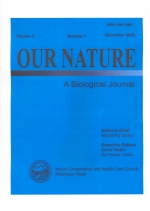Revisiting Underlying Ecological Principles of Rice-Fish Integrated Farming for Environmental, Economical and Social benefits
DOI:
https://doi.org/10.3126/on.v3i1.328Keywords:
Ecological principle, Rice-Fish integrated farming, Social benefitAbstract
Our goal is to revisit underlying ecological principle of rice-fish farming integration and synthesize information to suggest some pertinent patterns and connections that contribute to understanding of the interactions of abiotic and biotic factors in rice field for productivity enhancement. We synthesized ecological interactions, energy and material flow in absence and presence of bottom feeding omnivore fish to give a clear scenario of food web interactions in rice field. Rice plants, weeds and minute algae can be competitive to each other as they depend on common resources for growth. However, introduction of the fish about two weeks after rice plantation can add new link to the food chain by perturbation and top down control on rice competitors, pests and mobility of nutrients towards rice plant for increased rice field productivity to benefit the farmers economically, environmentally and socially. In relation to above synthesis, rice-fish integrated field experiments were performed in 4 mid hill districts of Nepal from 2000-2002. The results showed that despite of 3-5% loss of the rice cultivating area due to "trench" as fish hiding place, rice yield increased up to 9% in addition of 529 kg ha-1 fish from rice-fish integrated farming than cultivating rice alone. In rice-fish system, competitive advantages of rice plants over weeds and micro algae, control on rice pest and increased nutrient supply due to top down, perturbation and nutrient regeneration by fish were the reasons of increased rice yield in treatments than in controls where rice alone was cultivated.
Key Words: Ecological principle, Rice-Fish integrated farming, Social benefit
doi:10.3126/on.v3i1.328
Our Nature (2005) 3:1-12
Downloads
Downloads
How to Cite
Issue
Section
License
This license enables reusers to distribute, remix, adapt, and build upon the material in any medium or format for noncommercial purposes only, and only so long as attribution is given to the creator.




